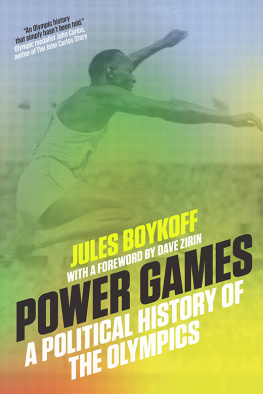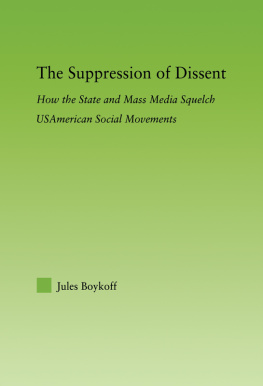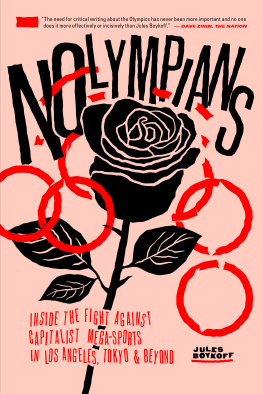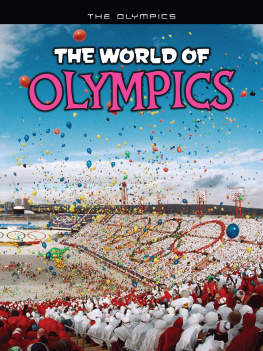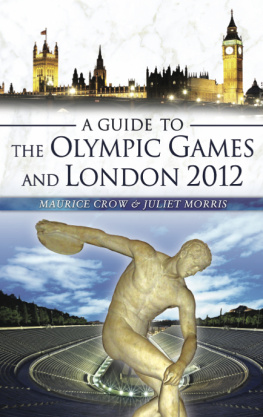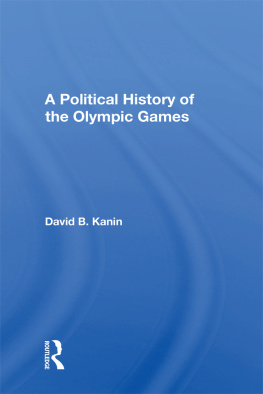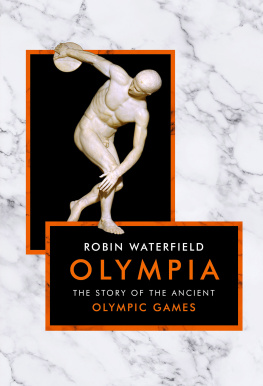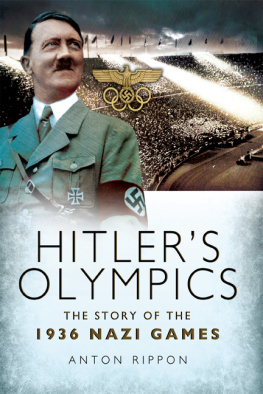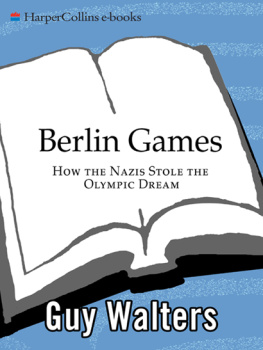My first Olympic memory is of Ronald Reagan. Seriously. Not the 1980 Miracle on Ice US hockey team, Edwin Moses, or Nadia Comaneci but Ronald Reagan. It was the 1984 Summer Games in Los Angeles and the competition was launched with a sunny address from the Gipper, played to rapturous cheers at the LA Coliseum. I cheered as well in my living room: cheering for Reagan was just like cheering for the Olympic heroes Id read about in Sports Illustrated: people like Carl Lewis, Mary Lou Retton, and a spindly twenty-year-old college basketball gravity-defier named Michael Jordan. I had only the most rudimentary idea that the Soviet blocour Cold War enemieswere boycotting the Games because we had refused to attend theirs four years earlier. I certainly had no conception that these Olympics had actually harmed people in Los Angeles who had been displaced or locked up in the name of Olympic security. I certainly had no idea about the costs, the corporate underwriting, and the general skullduggery of cash and human flesh passed under tables to keep everyone on the International Olympic Committee happy. I had no idea that there were people who tried to resist these initiatives but found themselves drowned out by the screeching anthems of obedience that are played on repeat, regardless of host country. I had no idea about any of this because there was not a 1980s version of the indispensable Dr. Jules Boykoff.
As a sportswriter who has covered every Olympics and World Cup over the last two decades, Ive learned that every mega-event contains debt, displacement, the militarization of public space, and varying degrees of resistance. These Olympic-sized crimes usually garner publicity as a curio about an individual countrys corrupt ways. But rarely does anyone mention that these issues afflict every Olympics or World Cup. Rarely is it mentioned that there is a continuity regardless of decade or host country that these mega-events are Typhoid Marys of organized graft.
My guide for understanding the past, present, and future of these struggles has been the work of the indispensable Jules Boykoff. What makes Boykoff so singular is that his starting point is not the internal machinations of the IOC or FIFA. Nor is his starting point ever about the Games themselves and the ways that geopolitical tensions find their way onto the field of play. His jumping-off point is always the people in the host country and how they are affected by the mega-event monolith.
By always beginning with the most beaten down, Boykoff has found himself more capable than any commentator working today of explaining why people have started to stand up, resist the coming Games, and see through the patriotic bombast to the pain the Games can bring. Whether it was the small demonstrations in London, the mass confrontations in Brazil, or the preemptive challenges toward hosting at all in places as disparate as Krakow and Boston, Boykoff tells these untold stories and translates the motivations of an international cast of characters with the lucidity of a great sportswriter and the depth of a scholar and political economist. In Power Games he combines meticulous archival research with on-the-ground interviews from Olympic sites and presents it all in a lively, engaging way. In doing so, he offers us the most important, comprehensive book on the Olympic Games that Ive come across. This is a political history of the Games that foregrounds themes all too often brushed under the historical rug: the extraordinary privilege that IOC elites have long enjoyed, the wrought-iron ties that the Games have to corporate capitalism, the problematic history the Olympics have with indigenous peoples, and the many ways activists have resisted the Olympic machine.
Jules Boykoff is a mild-mannered individual. He is also dangerous to a lot of powerful people. He is dangerous because he goes to the Olympic cities before the spotlight is turned on, and when the real action is played out in the shadows. He understands how the mega-event industrial complex works, and what people can do to bring it to its knees. Read this book. And if you have friends living in the next Olympic city, send them fifteen copies. These are words as weapons: armaments for those who wont have games played on their backs.
In so many ways, this book has been a collective effort. It has been my abundant fortune to have sharp minds and generous spirits on my team. I have numerous people to thank for their assistance, feedback, and encouragement during the writing of this book: Dan Burdsey, Ben Carrington, Tom Carter, Demian Castro, Julian Cheyne, Jeff Derksen, Janice Forsyth, Pete Fussey, Chris Gaffney, Tina Gerhardt, Eva Guggemos, Robin Hahnel, Reg Johanson, Katrina Karkazis, Pam Kofstad, Larissa Lacerda, Isaac Marrero-Guillamn, Cheleen Mahar, Gilmar Mascarenhas, Ian McDonald, Michelle Moore, Tom Mertes, Cecily Nicholson, Christine OBonsawin, Christian Parenti, Nicholas Perrin, Jessica Ritter, Matt Seaton, Orlando Santos Junior, Martin Slavin, Cynthia Sloan, Alan Tomlinson, Chris Wilkes, Theresa Williamson, and Dave Zirin.
Thank you to the International Centre for Olympic Studies at Western University in Canada for opening their archives to me. A big thank you goes to Rosemarie OConnor Quinn, Tom Quinn, and Mark Quinn for their hospitality in Dublin and for supplying a photograph of the remarkable Peter OConnor. And I am grateful to Aline Luginbhl from IOC Images for her assistance securing photographs. Thanks also to the Artists Rights Society and the Center for the Study of Political Graphics. Am Johal invited me to Simon Fraser University to present my ideas on the Olympics, as did Jennifer Allen and Adam Davis from Oregon Humanities, and David Harvey and Mary Taylor at the City University of New Yorkthank you all. I appreciate the kindness and courage of people at NoSochi2014, including Dana Wojokh, Tamara Barsik, Lisa Jarkasi, and Zack Barsik. Massive gratitude goes to Emily Van Vleet and Matthew Yasuoka for their remarkable, reliable research assistance over the years. Thanks be to Sue Schoenbeck, Thom Boykoff, and Meg Eberle for being faithful supporters of my work. And an enormous thank you to Andy Hsiao at Verso for believing in this project, for shaping it in important ways, and for helping me see it through. I am also grateful for Jeff Z. Kleins incisive editorial acumen.

